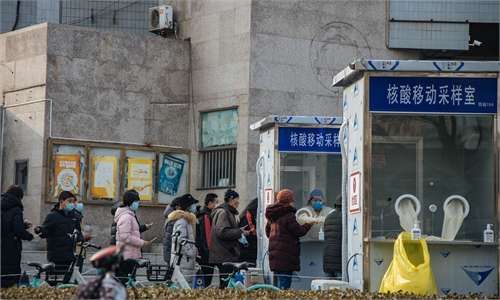Anal swab not feasible for mass testing, only being used in a few cities on high-risk groups

Medical workers work at the nucleic acid test laboratory. (Xinhua/Yang Shiyao)
News of the use of anal swabs for COVID-19 testing has startled Chinese netizens. The method is more accurate than nose and throat swabs, albeit awkward for recipients. Yet the Global Times learned that anal swabs are not feasible for mass testing and the method is only used in certain Chinese cities, such as Beijing and Qingdao, among certain high-risk groups, such as overseas arrivals.
"You take off your pants, lie on the bed, and then you feel the cotton swabs inserted into your anus twice and turned a few times, which takes about 10 seconds each time," was how one person who took the test described the "awkward" experience to the Beijing News.
But the method has only been used on a few key groups.
Shanghai used anal swab testing as one of the standards for releasing COVID-19 patients from the hospital in early 2020, but later dropped the requirement, Lu Hongzhou, co-director of the Shanghai Public Health Clinical Center at Fudan University in Shanghai, told the Global Times on Thursday.
With epidemic control pressure mounting, a few Chinese cities also rolled out the method for key groups, including people returning from overseas and close contacts of patients.
Beijing and Qingdao in East China's Shandong Province are requiring international arrivals to take the anal swab test before completing quarantine periods, the Global Times learned on Thursday.
Yangzhou in East China's Jiangsu Province also adopted the method in its routine monitoring of health status among cold-chain workers.
An internet user on Xiaohongshu, a social media platform, said that she had a "mental meltdown" when she was informed she had to take anal swabs along with other methods including nasal swabs, throat swabs, blood draws, and saliva tests, after she returned from overseas and was quarantined for 28 days.
Given the unpleasant experience involved in taking such tests, some netizens have asked whether it is necessary to adopt the method on top of the current ones, which have proved effective.
Addressing such concerns, Lu Hongzhou noted that testing using anal swabs is more stable and accurate than nose and throat swabs. It is more likely to get unusable samples and wrong results with nose and throat swabs, Lu said.
Scientists have also found that the clearance of coronavirus in nose and throat swabs is faster than anal swabs, which means that for silent carriers and people whose respiratory symptoms have disappeared, anal swabs will be more suitable.
Anal swabs aren't feasible in massive testing, but Lu supported expanding anal swab testing to all international arrivals and high-risk groups under medical observation to guarantee the testing accuracy.
Previous media reports said that many cities are using anal swabs as a method to double-check suspected cases, including Xi'an, capital of Northwest China's Shaanxi Province.

